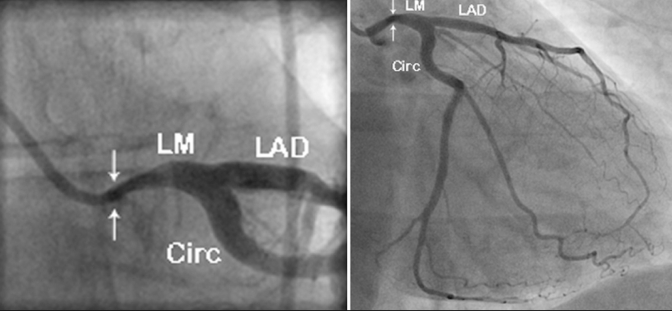A 67-year-old man with hypertension, dyslipidemia and a remote smoking history presented with angina. He had good functional capacity on a treadmill myocardial perfusion test, with no evidence of clinical, electrocardiographic or imaging changes diagnostic of ischemia; his ejection fraction was 57%. However, because of his persistent symptoms, he underwent cardiac catheterization, which revealed tight ostial left main artery stenosis of approximately 70% (Figure 1). The other coronary arteries showed minor luminal irregularities but no significant stenosis. A pressure wire across the left main artery was then used to assess the physiological properties of the lesion. There was a resting gradient of 1.0, and after adenosine injection according to protocol, the lowest gradient recorded was 0.87, which is not significant (significance defined as less than 0.75). Based on these physiological results and the patient’s good exercise capacity, medical management was optimized and the patient’s symptoms improved, sparing him an unnecessary, high-risk intervention. Pressure wires have increasingly been used to better characterize the physiology of the coronary arteries, rather than just completely relying on the coronary anatomy and the ‘oculostenotic reflex’, which can sometimes be misleading. It is important to point out, however, that the data for this indication, although very promising, are still limited, and there is little information on the long-term follow-up of similar patients.
Figure 1.
Coronary angiography in the right anterior oblique caudal view (A), with slight magnification in an anteroposterior shallow view (B), showing the left main coronary artery (LM) with apparent tight ostial stenosis of approximately 70% (arrows). LAD Left anterior descending artery; Circ Circumflex coronary artery



